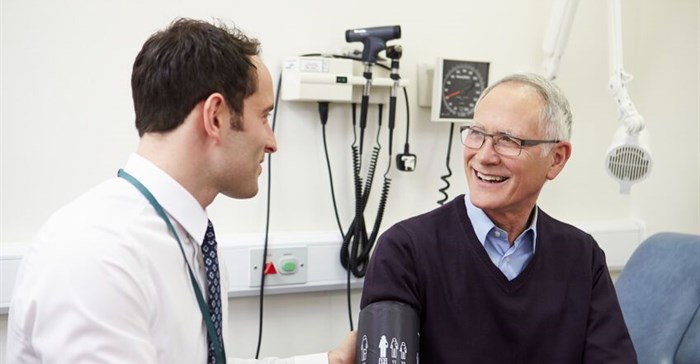A non-surgical procedure, which takes less than 10 minutes to relieve male urinary problems and treat benign prostatic hyperplasia (BPH) was successfully performed for the first time in South Africa, offering hope to the large percentage of men older than 40 who suffer from BPH.

Source: ©Mark Bowden
123rfThe procedure has no sexual side-effects, offers hope to many men who experience problems due to an enlarged prostate, such as slowness of the urinary stream, difficulty starting to urinate, frequent urination, needing to get up at night to urinate or pain after ejaculation or while urinating.
More than half of men aged 70 and older experience these symptoms.
A team from Stellenbosch University (SU) and the Tygerberg Academic Hospital, led by Prof André van der Merwe, Head of the Division of Urology at SU's Faculty of Medicine and Health Sciences (FMHS) and Dr Pieter Spies, also from the Division of Urology, performed the procedure on five patients at Tygerberg Hospital in early November.
Rezūm water vapour therapy
The procedure performed by Van der Merwe and his team is known as Rezūm water vapour therapy. It uses the natural energy stored in water vapour, or steam, to remove excess prostate tissue that is pressing on the urethra.
It is the first non-surgical treatment option for BPH patients in South Africa whose medical treatment has failed or who don’t want to be on medication for life. It has been used in Europe and the USA with great success over the past five years.
What makes this treatment so revolutionary is that it takes ten minutes or less and can be done in the outpatient setting. This allowed the SU team to perform the first five procedures at Tygerberg’s urology day-theatre complex last week.
Surgery the only option to now
Until now the only available treatment for South African patients not responding to BPH medication was surgery, with up to 40% of patients with symptomatic BPH requiring surgery.
The most common surgery performed for BPH is transurethral resection of prostate (TURP) and laser enucleation/resection of the prostate. It is performed under spinal or general anaesthesia and usually requires the patient to remain in hospital for two to three days.
Waiting time for this procedure in public hospitals is up to three years (there are 320 patients on Tygerberg’s TURP waiting list), mainly due to a shortage of hospital beds and constraints on theatre time.
TURP surgery also has some side effects, including retrograde ejaculation, bleeding and even erectile dysfunction in a minority of cases.
A long journey
Spies says it took van der Merwe and himself a few years to convince Boston Scientific, the company responsible for the technology internationally, to bring the product to South Africa and to get it registered with the South African Health Products Regulatory Authority.
The two of them, as well as five specialists from the private sector, were trained by Boston Scientific and received their accreditation.
The second set of procedures will be performed by private specialists on 17 November.
“The long journey to finally be able to bring the product to South Africa was worthwhile and the result of last week’s procedures has been beyond our wildest dreams,” says Spies.
Costly procedures
“We regard it as the answer to our enormous waiting list problem. We could help five patients within the space of two hours, compared to the hour and a half per patient required for surgery,” he says.
“It will especially be beneficial for older people who cannot undergo surgery, patients who are dependent on medication and older people with catheters. We can free them from catheters without the risk of anaesthesia and surgery,” adds Spies.
Van der Merwe, renowned as the surgeon who performed the world’s first successful penis transplant in 2014, says trained surgeons will be able to perform the procedure with ease.
The only concern is the cost-effectivity of the product. Boston Scientific sponsored the first five very costly procedures.
“A cost analysis of last week’s procedures will give us a good idea of how this can really work in public hospitals.
“Although the procedure makes a lot of financial sense, cutting on costs such as the regular replacement of catheters, visits to specialists or day hospitals and the use of antibiotics, it also has to fit into Tygerberg Hospital’s budget.
“The price will determine whether we will be able to buy it.
“Boston Scientific will have to look at its costing model to make it acceptable for state hospitals and we might have to concentrate on volume,” van der Merwe emphasises.



































